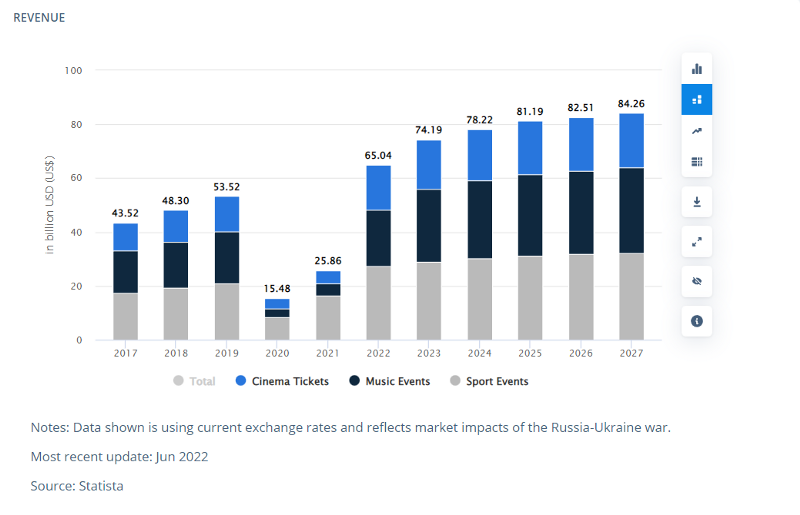NFT Ticketing Disrupting Event Management
How NFT Ticketing is Transforming the Entertainment Industry
How NFT Ticketing is Transforming the Entertainment Industry
Blockchain technology is revolutionizing many industries by enabling the development of innovative new applications. A great use case widely explored today is NFTs (non-fungible tokens), especially in the art and gaming industries.
But if NFTs have shown anything, it is that their use can be broad, beyond video game screens or a decentralized marketplace for works of art. The ability to tokenize almost anything in the physical world through NFTs opens the door to another giant sector, the event ticketing industry.
Plagued with major problems such as counterfeiting, scalping at exorbitant prices on secondary markets, or simply high-impact scalping and market promotion, the ticketing industry has a promising future with NFTs.
What challenges do NFTs solve in ticketing?
Counterfeit prevention: Unlike paper tickets and QR codes, NFTs cannot be forged due to their inherent blockchain properties of legitimacy, traceability, and authenticity.
Unfair fee structure: One big issue we frequently see in the ticketing industry is the fee structure set up to maximize profits from the promotion. Due to this failed system, true fans are left out of their favorite artists’ shows.
Monopoly around big players: Having a stranglehold on the people who buy and sell tickets, they take advantage of their dominant position to charge artists and event organizers excessive fees, sometimes allowing scalpers to take over the market.
High costs: NFT tickets can require much less time to produce than physical tickets, saving costs associated with production and accelerating ticket turnaround times.
Reduced chances of loss: Unlike physical tickets and QR codes, NFTs are recorded on a distributed ledger that can be accessed remotely anywhere in the world, with any device. This minimizes the risk of damage or loss of NFT tickets.
Fair income for all stakeholders: With NFT tickets, all parties involved in the event receive their guaranteed percentage of royalties from the issuance and resale of the ticket.
Goodbye to QR: NFT Tickets bring back the magic of souvenir tickets
With the advent of the Internet and smartphones, QR codes gave way to a digital form of tickets executed by the usual big companies, intending to monopolize the market while fighting against fraud and ticket resale outside of events.
As a result of the QR code wave, the memorable moments from events are limited to the memory capacity of the attendee. This is very different from what happened in the analog era when physical tickets were a collector’s item for a fan and even an income opportunity in a secondary market.
A ticket from Michael Jordan’s first NBA game would set you back $468,000. Just to mention an example of how valuable these memories can be.
Now with NFTs, tickets, memorabilia, and merchandise can be high-valuable collectibles for years.
With exclusive designs, real utility behind each NFT ticket is created, like a moment on your favorite artist’s stage or in their dressing room, and airdropped to event attendees who own an NFT ticket. Monetizing these special moments is part of the potential of this resurgent industry where the fan-artist relationship takes on a new dimension.
Additionally, event organizers can use NFTs to:
Turn tickets into collectibles
Create new forms of merchandise
Build communities & generate fandom
Give fans new & unique experiences
Host digital events in the metaverse
Maintain control over resales
Drive new revenue streams
Opportunities for all
All stakeholders managing an event and selling tickets have opportunities to benefit from NFTs.
Thus, guests can receive perks and incentives from event organizers, or they can resell rare tickets to collectors.
For their part, the organizers can earn a piece of the profit when a ticket owner resells the NFT ticket. They can also create art-like tickets representing the story of an event so that fans will want to collect them.
The artists can use NFT tickets to reward long-time fans with exclusive airdrops or other perks to elevate their experience.
A promising market
Despite being a new technology, NFT tickets have a market with great potential ahead of them.
The event ticketing industry sells more than 30 million tickets daily, although most of these tickets are resold on a secondary market estimated to be worth more than $15.2B.
According to Statista, the Total Ticket Sale Market will amount to $84.26B by 2027, growing at a CAGR of 5.31%, with projected earnings for this year of $65.04B.
The Total NFT Market Size is expected to be around $41B after reaching a monthly sales peak of $4.7B at the beginning of 2022 amid a craze for NFTs.
If we combine both industries, we can see that the opportunity for this nascent industry is enormous as NFTs become more popular in the daily lives of millions of people.
Early Movers in the NFT Ticketing Space
Despite being a relatively new industry, it is increasingly common to see organizers use NFTs to deploy ticketing for their events or use them as a means of social interaction with fans of shows of all kinds through digital collectibles and the like.
Existing companies like Live Nation Entertainment’s Ticketmaster are a clear example of how the big traditional players in the event ticketing industry are looking to expand by applying the use of NFTs.
Meanwhile, emerging companies such as YellowHeart, GUTS, Wicket, NFT Tix, SeatLab, and Vylto NFT are the visible face of the new players that seek to gain traction among the big players by applying the use of blockchain technology for the generation of NFT tickets from scratch.
There is no doubt that NFT ticketing is the future for ticketing companies, and artists like Maroon5 are already organizing their events with the support of dedicated NFT ticketing companies.
That is why it is increasingly common for events such as the Coachella or even NBA games to have the option of buying tickets through the use of NFTs.










